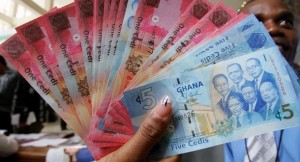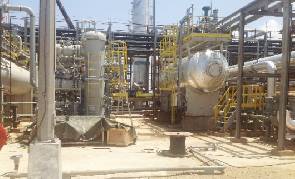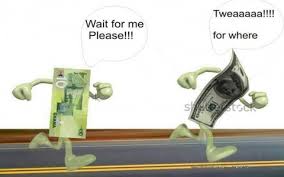 The Central Bank’s review of its directives on the use of foreign exchange (forex) to save the free fall of the Cedi is having a positive impact on the local currency as the Ghana cedi continues to gain strength against major foreign currencies.
The Central Bank’s review of its directives on the use of foreign exchange (forex) to save the free fall of the Cedi is having a positive impact on the local currency as the Ghana cedi continues to gain strength against major foreign currencies.
The latest euro bond and inflows from the cocoa syndicated loan have also impacted on the cedi, making it regain its lost glory.
A check by the Daily Graphic on inter-bank rates in Accra yesterday established that on the average, one dollar was bought at GH¢ 3.1, and sold for GH¢3.45; One pound was bought at GH¢5.2, and sold for GH¢ 5.6, while an Euro was also bought at GH¢ 4.1, and sold for GH¢4.4 .
On the black market, one dollar was bought at GH¢ 3.2, and sold for GH¢3.4; One pound was bought at GH¢5.0, and sold for GH¢ 5.1 while, an Euro was bought at GH¢ 3.9, and sold for GH¢3.94.
However at the forex bureaux, on the average, one dollar was bought at GH¢ 3.1, and sold for GH¢3.7; One pound was bought at GH¢5.6, and sold for GH¢ 6, while an Euro was bought at GH¢3.9, and sold for GH¢4.6.
Earlier directive by BoG
The BoG had earlier directed in February, this year, that all local transactions should be made in the local currency to stop the Ghana Cedi from further depreciating against major currencies.
It also placed a limit on how much forex could be withdrawn at the counter, among other directives.
A week before the directive was given, one dollar was bought at GH¢2.50 and sold for GH¢2.60; One pound was bought at GH¢4.50, and sold for GH¢ 4.60, while one euro was bought at GH¢ 3.70, and sold for GH¢3.80.
However, while the directive was in force, the Ghana Cedi’s situation worsened as it fell by up to 40 per cent within the first half of the year.
The situation forced the central bank to review its directives, following strong agitation by the public, including actors in the business sector, because of the negative impact on businesses in particular and the economy generally.
Currency analyst’s remark
A currency analyst, Mr Kofi Ampah, told the Daily Graphic that the phenomenon was the result of a number of factors, including the recent floating of the country’s third Eurobond, which had brought an additional $1 billion into the system.
The cocoa syndicated loan has also brought in about $1.7 billion, a situation which has helped stem the shortage of the dollar in the system.
In the currency market, the level of demand and supply is a key factor in determining the value of a currency.
In the last few months, Ghana’s currency suffered a major setback with demand for the US dollar far outstripping supply because that currency was the major currency used by many importers.
The situation forced the Ghana Cedi to plummet against the US dollar in particular by more than 40 per cent; the first in many months.
This forced the central bank to issue some directives which included a limit on how much could be withdrawn at the counter.
The move had a negative impact on the economy as business confidence in the system fell below expectation and that further weakened the cedi against the US dollar.
According to Mr Ampah, the withdrawal of the directives was also a factor in the Ghana Cedi regaining some strength and coupled with the huge inflows of the dollar, the cedi would end the year at GHc3.1.
Some players in the black market business told the Daily Graphic that the dollar had flooded the market.
“Now the dollar is everywhere so the prices are down,” they said and added that from the trend, they even expected a further drop.


